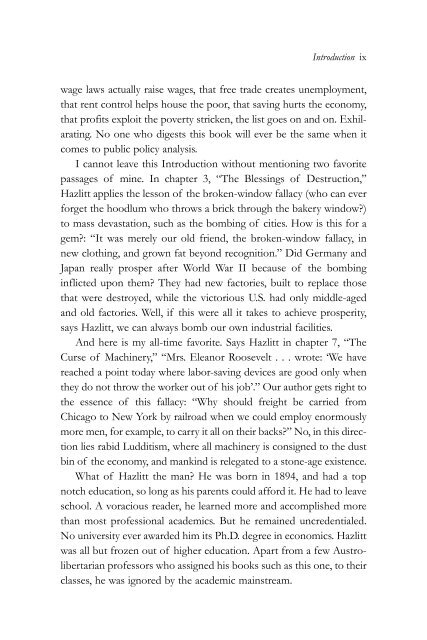1gDdM7w
1gDdM7w
1gDdM7w
- No tags were found...
Create successful ePaper yourself
Turn your PDF publications into a flip-book with our unique Google optimized e-Paper software.
Introduction ixwage laws actually raise wages, that free trade creates unemployment,that rent control helps house the poor, that saving hurts the economy,that profits exploit the poverty stricken, the list goes on and on. Exhilarating.No one who digests this book will ever be the same when itcomes to public policy analysis.I cannot leave this Introduction without mentioning two favoritepassages of mine. In chapter 3, “The Blessings of Destruction,”Hazlitt applies the lesson of the broken-window fallacy (who can everforget the hoodlum who throws a brick through the bakery window?)to mass devastation, such as the bombing of cities. How is this for agem?: “It was merely our old friend, the broken-window fallacy, innew clothing, and grown fat beyond recognition.” Did Germany andJapan really prosper after World War II because of the bombinginflicted upon them? They had new factories, built to replace thosethat were destroyed, while the victorious U.S. had only middle-agedand old factories. Well, if this were all it takes to achieve prosperity,says Hazlitt, we can always bomb our own industrial facilities.And here is my all-time favorite. Says Hazlitt in chapter 7, “TheCurse of Machinery,” “Mrs. Eleanor Roosevelt . . . wrote: ‘We havereached a point today where labor-saving devices are good only whenthey do not throw the worker out of his job’.” Our author gets right tothe essence of this fallacy: “Why should freight be carried fromChicago to New York by railroad when we could employ enormouslymore men, for example, to carry it all on their backs?” No, in this directionlies rabid Ludditism, where all machinery is consigned to the dustbin of the economy, and mankind is relegated to a stone-age existence.What of Hazlitt the man? He was born in 1894, and had a topnotch education, so long as his parents could afford it. He had to leaveschool. A voracious reader, he learned more and accomplished morethan most professional academics. But he remained uncredentialed.No university ever awarded him its Ph.D. degree in economics. Hazlittwas all but frozen out of higher education. Apart from a few Austrolibertarianprofessors who assigned his books such as this one, to theirclasses, he was ignored by the academic mainstream.


